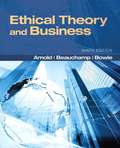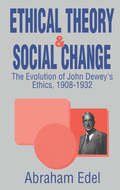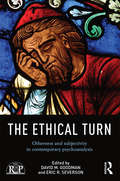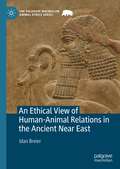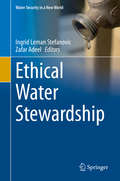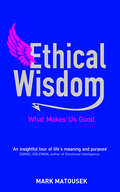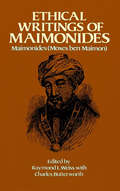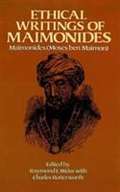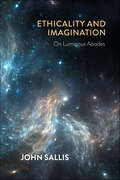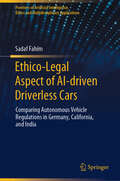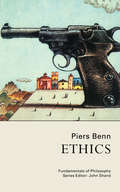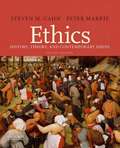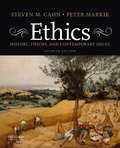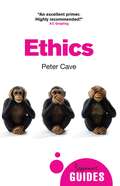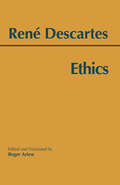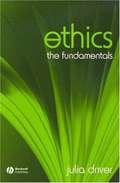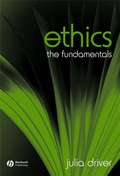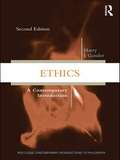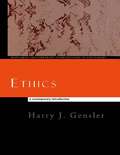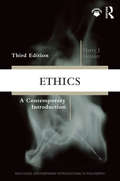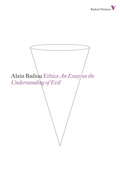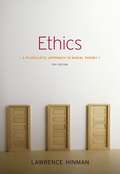- Table View
- List View
Ethical Theory and Business (9th Edition)
by Denis G. Arnold Tom L. Beauchamp Norman E. BowieAn anthology of readings, legal perspectives, and cases in business ethics. <br><br> Ethical Theory and Business provides students with a strong understanding of ethics in business. Case studies, a discussion of ethical theory, and a diverse range of perspectives on specific topics give students the tools needed to address ethical situations in business and challenge them to think for themselves. <br><br> Learning Goals <br> Upon completing this book readers will be able to:<br><br> Reflect on ethical and sustainable business practices<br> Understand the role of ethics in all function areas of business including management, marketing, international business, human resources, finance, and accounting<br> Discuss the most pressing issues confronting business leaders today
Ethical Theory and Social Change
by Abraham EdelJohn Dewey was unique among American philosophers in his insistence that the events, the social structure, the beliefs and attitudes of a period, its models of science and human history, all have some constitutive role in its philosophical theory. This belief is amply demonstrated in Dewey's own writings. Dewey and James H. Tufts' Ethics was first published in 1908 with a revised edition appearing in 1932. Dewey's part in the latter was wholly rewritten, and in effect constituted a new work, showing that Dewey did not believe ethical beliefs were eternal and unchanging. In Ethical Theory and Social Change, Abraham Edel provides a comparative analysis of the two editions to show how Dewey conceived ethics as part of an ongoing culture, not intelligible if isolated.The years between the two editions of Dewey and Tufts' Ethics were momentous in America and across the world. In 1908 industrialism was in high gear, putting greater pressure on social institutions and raising expectations of technological progress and extended democratic growth. By 1932, the devastation of World War I, economic depression, and the rise of totalitarianisms of the left and right had shattered that earlier optimism. The shift toward secular philosophy and new perspectives in research and method in the social sciences was challenging established universalizing views of morality with perceptions of fundamental moral conflict and the threat of relativism in their resolution.Dewey, is an ideal case for comparing changes in ethical theory over a quarter century. Unlike many philosophers he appreciated change and many of his basic ideas are geared to the problem of human control over change. Moreover he is concerned with the relation of theory and practice, and much of his work in metaphysics and epistemology is devoted to discovering the role that doctrines in these fields play and how they reflect the movement of social life. He is constantly concerned with ethics, with the history of ethics, and with the presuppositions of ethical theories that are studied in the social sciences and applied in the normative disciplines of politics, education, and law.Dewey's project of comparison in ethics reveals how theory is crystallized in the processes of the growth of knowledge in all fields and the human vicissitudes of history. Ethical Theory and Social Change will be of interest to philosophers, sociologists, and intellectual historians.
The Ethical Turn: Otherness and Subjectivity in Contemporary Psychoanalysis (Relational Perspectives Book Series)
by David M. Goodman Eric R. SeversonLevinas (1969) claims that "morality is not a branch of philosophy, but first philosophy" and if he is right about this, might ethics also serve as a first psychology? This possibility is explored by the authors in this volume who seek to bring the "ethical turn" into the world of psychoanalysis. This phenomenologically rich and socially conscious ethics has taken centre stage in a variety of academic disciplines, inspired by the work of philosophers and theologians concerned with the moral fabric of subjectivity, human relationship, and socio-political life. At the heart of this movement is a reconsideration of the other person, and the dangers created when the question of the "Other" is subsumed by grander themes. The authors showcased here represent the exceptional work being done by both scholars and practitioners working at the crossroads between psychology and philosophy in order to rethink the foundations of their disciplines. The Ethical Turn: Otherness and subjectivity in contemporary psychoanalysis guides readers into the heart of this fresh and exciting movement and includes contributions from many leading thinkers, who provide fascinating new avenues for enriching our responses to suffering and understandings of human identity. It will be of use to psychoanalysts, professionals in psychology, postgraduate students, professors and other academics in the field.
An Ethical View of Human-Animal Relations in the Ancient Near East (The Palgrave Macmillan Animal Ethics Series)
by Idan BreierExploring the earliest literary evidence for human-animal relations, this volume presents and analyzes biblical and Mesopotamian (Sumerian, Assyrian, and Babylonian) sources from the third millennium BCE through to the consolidation of the biblical literature in the first millennium BCE. Key Features:Provides the first comprehensive study of these texts from an ethical perspective.Examines proverbs, popular aphorisms, myths, epic literature, wisdom literature, historiography, prophecy, and law codes.Applies methodology from current contemporary biblical and ancient Near Eastern scholarship and human-animal ethics, thereby raising new questions that lead to fresh insights.An Ethical View of Human Animal-Relations in the Ancient Near East is essential reading for scholars and graduate students of animal ethics, applied ethics and biblical studies.
Ethical Violence
by Carlo BordoniHuman civilization is founded on ethical principles, norms of behaviour that have accumulated over time. Perhaps the oldest of ethical principles is the rejection of violence, which includes the respect for life and for the physical and psychological integrity of others. But, in some circumstances, violence itself can be regarded as ethical – for example, when it is used by states claiming to act in self-defence. In these circumstances, the need to defend oneself against an enemy can transform war from an unacceptable act into a necessary, socially shared and morally sanctioned choice. And it is when violence becomes ethical that we must begin to fear for our future. In the wake of the pandemic, we are witnessing the growing prevalence of aggression and emotionality in social and political life. We find ourselves living in an increasingly impatient and insecure society, which is sceptical of scientific thought and which takes refuge in the irrational. The decline of rationality and the growing prevalence of violence are increasingly common features of a society that has lost touch with the great Enlightenment narrative. We need, argues Bordoni, to rediscover the rationality we have lost and recuperate the positive side of technology.
Ethical Water Stewardship (Water Security in a New World)
by Ingrid Leman Stefanovic Zafar AdeelThis interdisciplinary book brings philosophers and non-philosophers to the table to address questions of water ethics, specifically in terms of how moral questions inform decision making around water security at local, national, and international scales.Water security, which pertains to the experience of assured access to clean water, is a broad concept that intersects human rights, politics, economics, law, legislation, public health, trade, agriculture, and energy. Decisions made at each of these intersection points have ramifications for human well being, especially for the populations that are marginalized in a societal and political sense. In this book, the ethical dimensions of decision-making at those intersection points are explored, and real-world examples are used to tease out some key insights. It charts how ethical consideration can help shape a future in which everyone will be water secure.
Ethical Wisdom: What Makes Us Good
by Mark MatousekSince the days of the first primitive tribes, we have tried to determine why one man is good and another evil. Mark Matousek arrives at the answer in Ethical Wisdom. Contrary to what we've been taught in our reason-obsessed culture, emotions are the bedrock of ethical life; without them, human beings cannot be empathic, moral or good. But how do we make the judgement call between self-interest and caring for others? What does being good really mean? Which parts of morality are biological, which ethical? When should instinct be trusted and when does it lead us into trouble? How can we know ourselves to be good amidst the hypocrisy, fears and sabotaging appetites that pervade our two-sided natures? Drawing on the latest scientific research and interviews with social scientists, spiritual leaders, ex-cons, altruists and philosophers, Matousek examines morality from a scientific, sociological, and anthropological standpoint. Each chapter features a series of questions, readings, interviews, parables and anecdotes that zoom in on a particular niche of moral enquiry, making this book both utilitarian and fun. Ethical Wisdom is an insightful and important book for readers crisscrossing their own murky moral terrain.
Ethical Writings of Maimonides
by MaimonidesPhilosopher, physician, and master of rabbinical literature, Moses ben Maimon (1135-1204) strove to reconcile biblical revelation with medieval Aristotelianism. His writings, especially the celebrated Guide for the Perplexed, exercised considerable influence on both Jewish and Christian scholasticism and brought him lasting renown as one of the greatest medieval thinkers.This volume contains his most significant ethical works, newly translated from the original sources by Professors Raymond L. Weiss and Charles E. Butterworth, well-known Maimonides scholars. Previous translations have often been inadequate -- either because they were not based on the best possible texts or from a lack of precision. That deficiency has been remedied in this text; the translations are based on the latest scholarship and have been made with a view toward maximum accuracy and readability. Moreover, the long "Letter to Joseph" has been translated into English for the first time.This edition includes the following selections:I. Laws Concerning Character Traits (complete)II. Eight Chapters (complete)III. On the Management of HealthIV. Letter to JosephV. Guide of the PerplexedVII. The Days of the MessiahTaken as a whole, this collection presents a comprehensive and revealing overview of Maimonides' thought regarding the relationship of revelation and reason in the sphere of ethics. Here are his teachings concerning "natural law," secular versus religious authority, the goals of moral conduct, diseases of the soul, the application of logic to ethical matters, and the messianic era. Throughout, the great sage is concerned to reconcile the apparent divergence between biblical teachings and Greek philosophy.
Ethical Writings of Maimonides
by MaimonidesHere are the most significant ethical writings of the 12th-century philosopher, physician, and master of rabbinical literature--newly translated from the original sources by noted Maimonides scholars Raymond L. Weiss and Charles E. Butterworth.
Ethicality and Imagination: On Luminous Abodes (The Collected Writings of John Sallis)
by John SallisEthicality and Imagination is the astounding conclusion to John Sallis's landmark trilogy launched with Force of Imagination and Logic of Imagination. In this new work,Sallis embarks on an unforgettable voyage spanning the cosmos and delving deep into what makes us human. If the first two works consider the question of being and thinking, respectively, the third and culminating volume takes up the question of action. In a series of highly original and always provocative meditations, Sallis articulates the way humans are rooted in their abodes yet not determined by them. Ethicality and Imagination develops a new approach to the relation of the imagination to literature, ethics, political thought, and recent discoveries in astrophysics. It represents a brilliant conclusion to one of the most exciting works of thinking in the Continental school in recent decades.
Ethico-Legal Aspect of AI-driven Driverless Cars: Comparing Autonomous Vehicle Regulations in Germany, California, and India (Frontiers of Artificial Intelligence, Ethics and Multidisciplinary Applications)
by Sadaf FahimThis book is a comparative study of the laws and regulations involving legal and ethical issues related to Artificial Intelligence (AI), in particular for self-driving cars or autonomous vehicles (AVs). It identifies, analyzes, and points out such issues via a study of laws and regulations in India, Germany, and California, determining the legal liabilities of designer, developer/programmer, manufacturer, producer, users, or AI in the case of AVs. AV technology is being touted as one that is poised to bring revolution in the mobility ecosystem by lessening the number of accidents and by providing other benefits, such as potential to reduce traffic, increase safety and mobility, lower energy usage and generate free time. Despite having such a potential to shape and transform the future, and involvement of tech-giants like Google, Amazon, Facebook, and Microsoft, regulations around AI and AVs are still on the drawing board stage in many countries, as they grapple on how to address this issue which has both local and global players involved and affects both local and global populace. The book studies and compares the existing and evolving regulations in three different regions to bring out the lacunae, loopholes and best practices. It highlights when AI deserves legal personhood, and when it requires to be granted legal standing. It also points out the civil and criminal legal liabilities arising when AV is involved in an accident, and the ethical issues involved in the deployment of AI. The book goes beyond new regulations to analyze whether challenges and problems arising from AI technology can be addressed within existing civil and criminal laws - procedural and substantive law – or whether a sui generis law on AI technology is required. The analysis and the results showcased here would be highly useful for multi-disciplinary research on the topic. Regulators of both industry and governance would find the contents invaluable in getting a broader picture of the issues and concerns around this topic, along with policy makers would be able to come up with more effective regulations on AI and AVs.
Ethics: Bullet Guides
by Robert AndersonOpen this book and you will Understand morals Discover freedom Meet key figures Apply ethics
Ethics (Fundamentals of Philosophy #3)
by Piers Benn Dr Piers BennThis introduction to ethics judiciously combines moral theory with applied ethics to give an opportunity for students to develop acute thinking About Ethical Matters.; The Author Begins Motivating A Concern For moral discourse by dispelling often met objections over relativism and subjectivity. interweaving normative and meta-ethical considerations, a convincing modern account of moral thinking emerges.; Moral theories - consequentialism, Kantianism, contractualism - are explained and illustrated in a way that holds the reader's attention, and students of ethics will take away a perceptive and practical understanding of the nature of moral reasoning and an ability, on such matters, to think afresh for themselves.
Ethics: History, Theory, and Contemporary Issues, Sixth Edition
by Steven M. Cahn Peter MarkieEthics: History, Theory, and Contemporary Issues, Sixth Edition, features fifty-nine selections organized into three parts, providing instructors with great flexibility in designing and teaching a variety of courses in moral philosophy. Spanning 2,500 years of ethical theory, the first part, Historical Sources, ranges from ancient Greece to the twentieth century and now includes the complete text of John Dewey's Theory of Valuation. The second part, Modern Ethical Theory, includes many of the most important essays of the past century. The discussion of varieties of normative ethics continues in the work of major contemporary philosophers, while landmark selections reflect concern with moral language and the justification of morality. In the third part, Contemporary Moral Problems, the readings present the current debates over abortion, euthanasia, famine relief, environmentalism, and the use of torture in interrogations, as well as essays on the trolley problem, death, and the meaning of life. One-third of the selections are authored by women. Wherever possible, each reading is printed in its entirety.
Ethics: History, Theory, And Contemporary Issues
by Steven M. Cahn Peter MarkieEthics: History, Theory, and Contemporary Issues, Fifth Edition, features sixty-nine selections organized into three parts, providing instructors with great flexibility in designing and teaching a variety of courses in moral philosophy. Spanning 2,500 years of ethical theory, the first part,Historical Sources, ranges from ancient Greece to the twentieth century. It moves from classical thought through medieval views to modern theories, culminating with leading nineteenth- and twentieth-century thinkers. The second part, Modern Ethical Theory, includes many of the most important essaysof the past century. The discussion of utilitarianism, Kantianism, egoism, and relativism continues in the work of major contemporary philosophers, while landmark selections reflect concern with moral language and the justification of morality. The concepts of duty, justice, and rights are explored,as well as recent views on cultural relativism and an ethic influenced by feminist concerns. In the third part, Contemporary Moral Problems, the readings present the current debates over abortion, euthanasia, famine relief, animal rights, environmentalism, and the use of torture in interrogations,as well as essays on death and the meaning of life. Wherever possible, each reading is printed in its entirety.The fifth edition features new readings from Cicero, Barbara Herman, and Judith Jarvis Thomson; an expanded selection from Joseph Butler's Fifteen Sermons; and a new translation of Kant's Groundwork for the Metaphysics of Morals. In addition, the book is supplemented for the first time by a robustsupport package. An Instructor's Resource CD contains reading summaries, essay questions, multiple-choice and true/false questions, PowerPoint-based lecture outlines, and relevant website links. A Companion Website at www.oup/us/cahn provides most of the material from the Instructor's Resource CDalong with student resources including interactive self-quizzes, questions for discussion, and helpful links.
Ethics: A Beginner's Guide (Beginner's Guides)
by Peter CaveFrom Confucianism to Kant's categorical imperative, from the Ancient Greeks to Amnesty International, This essential volume presents ethics through a fascinating global historical lens and relates it to everyday life and 21st-century politics. Peter Cave traces the development of this key branch of philosophy up to the present day, introducing readers to all the main schools of thought. With his characteristic wit and clarity, Cave takes on good and evil, power and politics, and liberalism and relativism, and handily guides us around some of the most common potholes in ethical reasoning. Applying theory to contemporary concepts like corporate social responsibility and bioethical issues such as so-called designer babies, this is an indispensable primer on the subject.
Ethics (Hackett Classics)
by René DescartesThough Descartes never wrote a book specifically devoted to moral philosophy, his thought on ethical matters can be found throughout his correspondence and in parts of his work Passions of the Soul. In 1685, an anonymous editor in London gathered these writings in a textbook devoted to Descartes&’s ethical thought. Roger Ariew has translated, from Descartes&’s original French texts, those selections included in the 1685 volume, adding to those writings an Appendix of relevant materials, including Part III of the Discourse on Method on the provisional morals, a portion of the Preface to the French edition of the Principles of Philosophy on the &“tree&” of philosophy, and portions of additional letters that help to illuminate the background for the correspondence included in the 1685 volume. Ariew&’s insightful Introduction explains the contexts in which Descartes addressed ethical questions, the reasoning behind his reluctance to write specifically about moral issues, and the significance of what this collection of writings reveals.
Ethics: The Fundamentals (Fundamentals of Philosophy Series)
by Julia DriverEthics: The Fundamentals explores core ideas and arguments in moral theory by introducing students to different philosophical approaches to ethics, including virtue ethics, Kantian ethics, divine command theory, and feminist ethics. The first volume in the new Fundamentals of Philosophy series. Presents lively, real-world examples and thoughtful discussion of key moral philosophers and their ideas. Constitutes an excellent resource for readers coming to the subject of ethics for the first time.
Ethics
by Julia DriverEthics: The Fundamentals explores core ideas and arguments in moral theory by introducing students to different philosophical approaches to ethics, including virtue ethics, Kantian ethics, divine command theory, and feminist ethics. The first volume in the new Fundamentals of Philosophy series. Presents lively, real-world examples and thoughtful discussion of key moral philosophers and their ideas. Constitutes an excellent resource for readers coming to the subject of ethics for the first time.
Ethics: A Contemporary Introduction
by Harry J GenslerHarry Gensler's Ethics introduces undergraduates to the main issues in contemporary moral philosophy. It also relates these issues to practical controversies, with special attention paid to racism, moral education, and abortion. It gives a practical method for thinking about moral issues, a method based largely on the golden rule. Key Features:* Serves as either the sole textbook for a lower-level introduction to ethics/moral philosophy course or a supplementary text for a more advanced undergraduate ethics course* Provides clear, direct writing throughout, making each chapter easily accessible for an engaged undergraduate* Offers a philosophically rigorous presentation of the golden rule* Includes helpful study aids, including: bolded technical terms, boxes for key ideas, chapter summaries, suggested readings, and a glossary/index Key additions to the Second Edition:* A new chapter on virtue ethics, which deals with Aristotle, Plato, and related controversies* A new chapter on natural law theory, which deals with Aquinas, double effect, sexual morality, and related controversies* A significantly revised chapter on the golden rule, which is now much clearer on certain key points* A significantly revised chapter on nonconsequentialism, which now has expanded coverage of human rights, libertarianism, and socialism, and uses the right to health care as a case example* An expanded bibliography* A new appendix that overviews key books students will want to pursue upon completing Ethics: A Contemporary Introduction, Second Edition* A rewritten instructional program, EthiCola, which is now much easier to download and use and has (for students) revised exercises for each chapter and (for instructors) a score-processing program, class slides, and instructor's manual. This can be found on the book's companion website: http://www.routledge.com/textbooks/gensler.
Ethics: A Contemporary Introduction (Routledge Contemporary Introductions to Philosophy)
by Harry J. GenslerEthics introduces the issues and controversies of contemporary moral philosophy to undergraduate students who have already done an introductory course in philosophy. It will help students to think more clearly about how to form their moral beliefs in the wisest and most rational way. The basic approaches to metaethics and normative ethics are related to specific issues, particularly those of racism, education, and abortion. Written in a clear and concise way by an experienced textbook author, Ethics will also be of interest to the general reader.Unique features of the textbook:* boxed key ideas* Glossary of philosophical terms* Chapter summaries and study questions * Annotated further reading and Internet Web resourcesThere is an associated website for teachers and students at www.routledge.com/routledge/philosophy/cip/ethics.htm
Ethics: A Contemporary Introduction (Routledge Contemporary Introductions to Philosophy)
by Harry J GenslerEthics: A Contemporary Introduction introduces the issues and controversies of contemporary moral philosophy. It gets students to struggle with the big questions of morality while it also relates these questions to practical issues, especially racism, global warming, moral education, and abortion. Providing a practical method for thinking about moral issues—a method based largely on the golden rule—it is written simply and clearly throughout. College students who are new to philosophy or who have already taken an introductory-level course will benefit from its use. Key Features: Serves as either the sole textbook for a lower-level introduction to ethics/moral philosophy course or a supplementary text for a more advanced undergraduate ethics course. Provides clear, direct writing throughout, making each chapter easily accessible for an engaged undergraduate student. Offers a philosophically rigorous presentation of the golden rule. Includes helpful study aids, including: bolded technical terms; boxes for key ideas; summaries, study questions, and suggested readings for each chapter; and a comprehensive glossary/index at the back of the book. Key Additions to the Third Edition: Each chapter now offers additional, optional sections on more advanced topics for students wishing to dig deeper into the material (advanced topics include: Kohlberg’s moral psychology, whether morality is gendered, types of relativism, early Greek ethics, Hume, and the prisoner’s dilemma). Other improvements include: better chapter organization, clearer explanations, improved examples, new names for key arguments, and a better Kindle version. An updated and improved EthiCola instructional program (with a score-processing program, teacher’s manual, and class slides), which can be downloaded from the web for free (from www.harrycola.com/ec or www.harryhiker.com/ec).
Ethics
by Peter Hallward Alain BadiouAlain Badiou, one of the most powerful voices in contemporary French philosophy, shows how our prevailing ethical principles serve ultimately to reinforce an ideology of the status quo and fail to provide a framework for an effective understanding of the concept of evil.
Ethics: A Pluralistic Approach To Moral Theory, 5th Edition
by Lawrence M. HinmanETHICS: A PLURALISTIC APPROACH TO MORAL THEORY, FIFTH EDITION provides a comprehensive yet clear introduction to the main traditions in ethical thought, including virtue ethics, utilitarianism, and deontology. Additionally, the book presents a conceptual framework of ethical pluralism to help readers understand the relationship among various theories. Lawrence Hinman, one of the most respected and accomplished professionals in ethics and philosophy education today, presents a text that gives readers plentiful opportunities to explore ethical theory and their own responses to them, using fascinating features such as the "Ethical Inventory" sections that appear at the beginning and the end of the text. End-of-chapter discussion questions, and the use of current issues and movies help students retain what they've learn and truly comprehend the subject matter.
